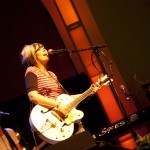Look at what they’ve done to us. Gone is any sense of the public good — not even that there is a public good in which Asian Americans don’t get to participate because we are a supposedly insular community, but that there is no public good, period. In its place, we have private rights — the rights of the African American community for justice, the rights of the police to be respected, the rights of journalists to do their jobs, the rights of Asian Americans to stay out of it all. Of course we wouldn’t want to comment on Ferguson: any comment we make within that ‘private rights’ framework would be construed as Asian Americans taking up our place as the model minority to adjudicate the balance of rights. As many of my Asian American friends have said repeatedly, ‘We see both sides.’ Translation: ‘Who am I to judge?’ Question: why are we set up as judges?
That private mentality is a betrayal of everything it means to be Asian American. To say that Asian American is simply people of Asian descent taking on American cultural characteristics is to deny history. To call oneself Asian American is to invoke the moments when Asians in America rose up against the term ‘oriental’ and declared on the campuses of San Francisco State College and the University of California, Berkeley, in 1968 that we have agency and that, along with the Black Student Union and as part of the Third World Liberation Front, we demand that the public university serve the public good by materially empowering communities that have been historically racialized in American society. The chant of the students was not ‘material for our community’ — it was ‘Power to the People!’ — the people, because people of color are people too who publicly exist in this common society. To call myself Asian American is to declare that I am part of this public people.
The characteristic that marks this public people is the act of public solidarity. If we ask, Why do Asian Americans care about what is happening to Ferguson? then we have erased Richard Aoki and Yuri Kochiyama from history. We might as well ask what Aoki was doing with the Black Panthers, why Malcolm X died in Kochiyama’s arms. It turns out that the elevation of private interest makes public solidarity incomprehensible. And therein lies the problem.
Ellen Wu’s groundbreaking text, The Color of Success: Asian Americans and the Origins of the Model Minority suggests that a sort of liberal American agenda that reigned supreme from the 1930s into the 1960s tried relentlessly — with some degrees of success — to continually articulate Asian American communities as fundamentally self-interested model American communities that may not ever become fully white, but were definitively not black. The Asian American Movement rejected this ‘model minority stereotype,’ championing the publicness of Asian America and the solidarity of Asian Americans with other racialized communities as a matter of public importance. Yet if a sequel to Wu’s text were to be written, the record may well show that the ideology of the privatized model minority has prevailed and continued to penetrate the language of Asian American communities.
What have we got to show for this private consensus? We have the shooting of Latasha Harlins, a fifteen-year-old African American woman shot by a Los Angeles Korean American grocery store owner Soon Ja Du because Du thought Harlins was stealing orange juice. We have Sa-I-Gu, the 1992 riot in Los Angeles’s Koreatown that occurred because Harlins’s death was linked to the acquittal of cops who beat up Rodney King. We have the events in San Francisco in 2010 where elderly Chinese Americans being beaten to death by African American youth was followed by 22-year-old Amanze Emenike’s commentary for New American Media that bluntly, brutally, and even blasphemously explained, ‘The reason Asian kids are getting robbed is because there is an assumption that young Chinese kids on Third Street are filthy rich and have an i-Pod or laptop on them. To a young, broke black male, the appeal of nabbing a few hundred dollars from some Asian kid’s pocket is even greater during this recession. The young homies in Hunters Point need money for shoes and clothes.’ We have the constant insinuations within Asian American communities that African Americans are not safe to be around, enough for the Chinese for Affirmative Action’s Vincent Pan to pen his own op-ed calling for funding to look at how race and public safety are mutually intertwined issues.
All we have to show for our privatizing model minority revision of Asian American history is racial mistrust, our particular contribution to the fragmentation of American public life.












